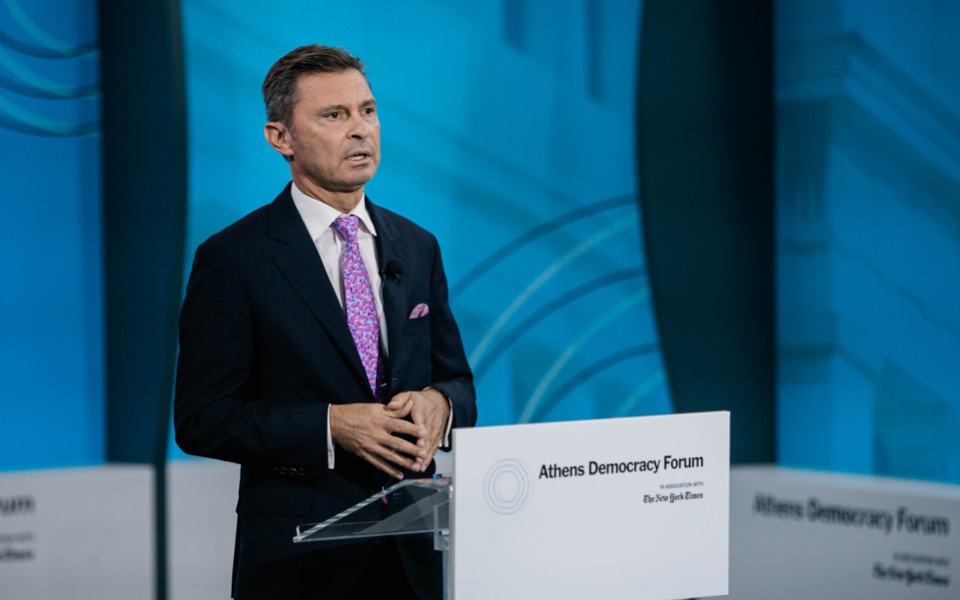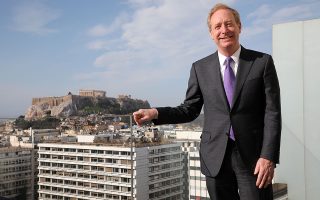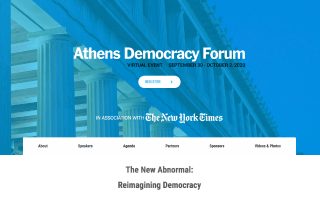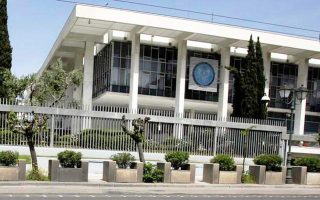Athens Democracy Forum looks to the future

This year’s Athens Democracy Forum has not only given us pause for thought, airing the interesting views of the many internationally renowned speakers on its various panels, but it has also demonstrated its innovative and daring nature. While it captured the Zeitgeist with all the phenomenal challenges posed to societies, economies and democracies, it has also evolved in a way that it can now be seen as a model for future conferences.
The 2020 Athens Democracy Forum – its eighth edition – was organized by the Democracy & Culture Foundation in partnership with The New York Times, under the auspices of Greek President Katerina Sakellaropoulou in collaboration with the United Nations Democracy Fund, the Kofi Annan Foundation, the City of Athens and Kathimerini. The primary presenter of the conference was New York Times columnist Roger Cohen and two of its coordinators were Liz Alderman, the NYT’s chief European business correspondent, and Steven Erlanger, the paper’s chief diplomatic correspondent in Europe.
The 2020 Athens Democracy Forum’s opening speech was delivered by President Sakellaropoulou. Among the events that attracted particular interest were the speeches and conversations involving Council of Europe officials on human rights, climate change and the refugee crisis, alongside a number of panels on the impact of technology. The Aristotle Address by Microsoft President Brad Smith and the participation of European Commission Vice-President for Democracy and Demography Dubravka Suica and European Commission Vice-President Margaritis Schinas were also standout events at this year’s Forum. A special presentation was that of the City of Athens Democracy Award by Mayor Kostas Bakoyannis to Fernando Henrique Cardoso, the former president of Brazil.
Among other distinguished guests were the president of the National Assembly of Venezuela, Juan Guaido, and the internationally renowned lawyer specializing in information law Dan Shefet, while the conversation between the best-selling writer and historian Yuval Noah Harari, Microsoft President Brad Smith and the CEO and founder of CinqC, Kristen Davis, titled “Technology and the Future of Democracy” and coordinated by Kathimerini’s Executive Editor Alexis Papachelas, attracted huge interest. The next day, Saturday, Harari had a conversation with Greek Prime Minister Kyriakos Mitsotakis in an al fresco setting with the Parthenon in the background, quite fitting for deep thinking about the future of democracy.
Summing up the organizational side of this year’s Forum, Kim Conniff Taber, editorial director of the Athens Democracy Forum and the Democracy & Culture Foundation, stated: “For this year’s Athens Democracy Forum, we made a concerted effort to connect people who are out in the field working directly with citizens to those who are working more on the policy level (from NGOs to government) and those on the business side who are eager to invest in change but want or need fresh ideas. This is underpinned by journalists who ask the hard questions and hold everyone to account. It’s the intersection of all of these elements that we think is crucial to fostering democracy.”
Achilles Tsaltas, president of the Democracy & Culture Foundation, points to ways in which the pandemic serves as an opportunity. “The pandemic crisis forced us to rethink the format and made us more creative by not just going virtual but instead building a studio in Athens and, despite the restrictions, still inviting most speakers to attend in person,” he says. “This has made the conversations more interactive and lively. And it has made me realize that even when the pandemic is over, we will not be returning to the traditional way of convening conferences.”
Tsaltas views Covid-19 creatively, as a catalyst for not only adding a virtual dimension to the Forum but, significantly, to get in-person and virtual participants to interact on a much bigger scale. In this way, this year’s Forum saw delegate numbers in excess of 7,000 (compared to last year’s 400) while some sessions had more than 100,000 views on various social media platforms. “This was truly the most democratic event that we have ever staged, with audiences being able to join from the world over,” he says. “One thing we have learned for next year is to train our moderators to include the audience even more, so the event moves from the digital to the truly interactive.”
What is also commonly accepted, according to Tsaltas, is “the fact that some 30 speakers traveled to Athens (including big names like Yuval Noah Harari, Brad Smith and Council of Europe Secretary-General Marija Buric) is not only an accolade to the increased relevance and urgency of the Athens Democracy Forum, but also honors Greece and Greeks that these people chose to come all the way to Athens despite the pandemic and the restrictions.”
The 2020 Athens Democracy Forum has been characterized by two more innovations. First, the organizers made creative use of the word “pandemic” and its relationship with democracy. Covid-19 has been correctly identified as just one of various “pandemics” democracy has to deal with: inequality, climate change, migration shifts, fake news, populism. “These are the topics we dealt with, keeping in mind that Covid-19 is actually the catalyst in accelerating our search for solutions to these other ‘pandemics,’” Tsaltas says.
Finally, the Forum did not miss the evolving side of democracy. Democracy is not a static concept that can be “threatened” and should be “defended,” but a dynamic adaptive process. “The infotech and biotech revolutions that our world is undergoing make it essential for democracy to adjust to this new reality through greater citizen engagement and better governance,” says Tsaltas. “There was so much said during the conference about how we stand a real chance of coming closer to the concept of Athenian democracy through the positive use of technology and social media.”





